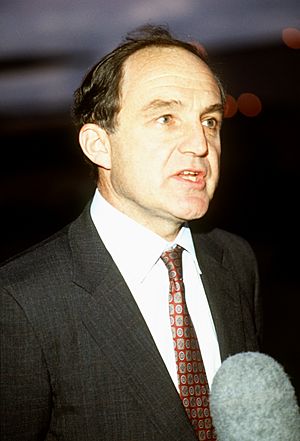George Younger, 4th Viscount Younger of Leckie facts for kids
Quick facts for kids
The Viscount Younger of Leckie
|
|
|---|---|
 |
|
| Secretary of State for Defence | |
| In office 9 January 1986 – 24 July 1989 |
|
| Monarch | Elizabeth II |
| Prime Minister | Margaret Thatcher |
| Preceded by | Michael Heseltine |
| Succeeded by | Tom King |
| Secretary of State for Scotland | |
| In office 4 May 1979 – 9 January 1986 |
|
| Monarch | Elizabeth II |
| Prime Minister | Margaret Thatcher |
| Preceded by | Bruce Millan |
| Succeeded by | Malcolm Rifkind |
| Shadow Secretary of State for Defence | |
| In office 18 February 1975 – 15 January 1976 |
|
| Leader | Margaret Thatcher |
| Preceded by | Peter Walker |
| Succeeded by | Ian Gilmour |
| Minister of State for Defence | |
| In office 8 January 1974 – 4 March 1974 |
|
| Monarch | Elizabeth II |
| Prime Minister | Edward Heath |
| Preceded by | Ian Gilmour |
| Succeeded by | William Rodgers |
| Parliamentary Under-Secretary of State for Scotland | |
| In office 24 June 1970 – 8 January 1974 |
|
| Monarch | Elizabeth II |
| Prime Minister | Edward Heath |
| Preceded by | Bruce Millan |
| Succeeded by | Teddy Taylor |
| Member of the House of Lords | |
| as a hereditary peer 25 June 1997 – 11 November 1999 |
|
| Preceded by | The 3rd Viscount Younger of Leckie |
| Succeeded by | Seat abolished |
| as a life peer 7 July 1992 – 26 January 2003 |
|
| Member of Parliament for Ayr |
|
| In office 15 October 1964 – 16 March 1992 |
|
| Preceded by | Thomas Moore |
| Succeeded by | Phil Gallie |
| Personal details | |
| Born |
George Kenneth Hotson Younger
22 September 1931 Stirling, Scotland, UK |
| Died | 26 January 2003 (aged 71) Gargunnock, Scotland, UK |
| Political party | Conservative |
| Other political affiliations |
Unionist (until 1965) |
| Spouse |
Diana Tuck
(m. 1954) |
| Children | 4 |
| Alma mater | New College, Oxford |
| Military service | |
| Allegiance | United Kingdom |
| Branch/service | British Army |
| Unit | Argyll and Sutherland Highlanders |
| Battles/wars | Korean War |
George Kenneth Hotson Younger (born September 22, 1931 – died January 26, 2003) was an important British politician and banker. He was a member of the Conservative Party. He held several big jobs in the government, including being in charge of Scotland and later the country's defence. He also came from a family with a long history in business and politics.
Contents
Early Life and Education
George Younger was born in Stirling, Scotland, in 1931. His family had a long history in brewing, starting with George Younger in the 1700s. His great-grandfather, also named George Younger, was given the title of Viscount Younger of Leckie in 1923. George was the oldest of three sons.
He went to Cargilfield Preparatory School and Winchester College. Later, he studied at New College, Oxford, where he earned a Master's degree. After his studies, he joined the British Army. He served in the Korean War with a famous Scottish regiment called the Argyll & Sutherland Highlanders.
In 1954, George Younger married Diana Tuck. They had four children together. One of their children, James Younger, later took over his father's title.
Political Career Highlights
George Younger first tried to become a Member of Parliament (MP) in 1959 but was not successful. He later stepped aside in another election to allow Alec Douglas-Home, who was becoming Prime Minister, to enter Parliament.
Becoming an MP
In 1964, George Younger was elected as the MP for Ayr. This was the same seat his great-grandfather had held. He became a key figure in the Conservative Party.
Secretary of State for Scotland
For seven years, he served as Secretary of State for Scotland under Prime Minister Margaret Thatcher. In this role, he was responsible for many important decisions affecting Scotland.
Secretary of State for Defence
In 1986, he took on an even bigger role. He became the Secretary of State for Defence. This happened after Michael Heseltine resigned from the government because of a disagreement about helicopters, known as the Westland affair. George Younger was then in charge of the UK's armed forces.
In the 1987 election, he won his seat again by a very small number of votes. This showed how close the election was in Scotland at that time.
Later Years and Other Roles
George Younger left the government in 1989. After his political career, he moved into the world of banking. He joined the Royal Bank of Scotland and became its chairman in 1992.
He was given a special title, Baron Younger of Prestwick, in 1992. This meant he could sit in the House of Lords, which is part of the UK Parliament. Even after a law changed how people could be in the House of Lords in 1999, he was still able to stay.
In 1995, Queen Elizabeth II honored him by making him a knight of the Order of the Thistle. This is a very high award in Scotland. George Younger also served as the Chancellor of Edinburgh's Napier University from 1993 until he passed away. He also had important roles with the Church of Scotland in his final years.
 | George Robert Carruthers |
 | Patricia Bath |
 | Jan Ernst Matzeliger |
 | Alexander Miles |

